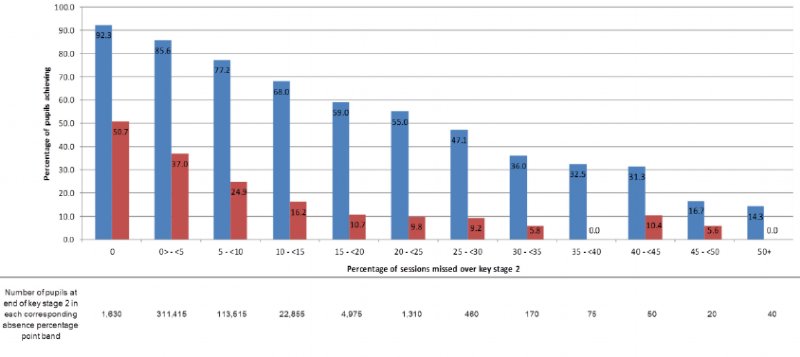School Attendance
At Launde Primary Schoo we place an emphasis on the importance of regular and punctual school attendance. We believe through good attendance at school children will achieve higher attainment, have better opportunities and establish good habits that will support them throughout their lives.
Our school Attendance Lead is Mrs S Meer.
We understand that there may be unavoidable circumstances on occasions when your child is absent from school and we would like to take this opportunity to remind you of the school absence procedures.
Illness:
Occasionally, your child may wake up on a school day and say that they feel unwell. Parents will assess and decide if they think their child is well enough to attend school or needs to be kept at home. If your child has no temperature but has a cough, cold, headache or earache then (as with adults) medical advice is to give them paracetamol (Calpol, etc) and send them to school. We will always contact you if your child’s condition worsens or if we believe it is contagious such as chicken pox, vomiting, etc. If you’re not sure if your child’s illness is classed as infectious or whether they need to be kept off school and for how long, then contact the school office who will offer advice and information.
If you decide that your child is unable to attend school due to illness the following procedure applies:
• If a child is absent from school parents should contact the school on the 1st day of absence by 9.30am to inform the school of the reason for absence.
• Parents are expected to maintain contact with the school throughout the absence.
It is a school’s decision whether to accept a reason for a child’s absence and whether to authorise that absence. In the majority of cases a parents’ note explaining that their child was ill can be accepted without question. Further evidence of a child’s illness may be requested if their attendance is an ongoing concern.
Medical and Dental Appointments:
• Where possible such appointments should be booked outside of school hours
• When a pupil has a medical or dental appointment this should be confirmed with an appointment card or letter
• Pupils are expected to attend school prior to the appointment and return to school after the appointment. Any absence outside of the appointment/travel time will be unauthorised
• Authorisation will not be given for pupils to attend family member’s medical appointments
Unexplained absences:
Unexplained absences from school give serious cause for concern as the school is unable to confirm the whereabouts and safety of a child. In the instance of unexplained absence, the following procedures will apply:
• At 9.30 am the school registers are checked for any absences where there has been no contact by parents/carers or reason given
• School staff will attempt to make telephone contact with parents/carers to ascertain a reason for the child’s absence from school
• If the parent/carer cannot be contacted, then school staff will contact the other emergency contacts for the child
• If staff are unable to contact parents/carers or other emergency contacts or ascertain the reasons for a child absence this may be followed by a home visit by either members of school staff or Central School Attendance and Welfare Service Officer
• As we have a safeguarding duty for our pupils, it is essential that we know where all our pupils are during the school day and where we are unable to ascertain this it may be necessary to contact the police to undertake a safe and well check
• School is required to have more than one emergency contact for each pupil – p lease ensure the school has up-to-date addresses and telephone numbers for all contacts
Persistent absence and unauthorised absence:
We take a proactive approach to improving the attendance of individual children whose attendance falls below 96%. Children who have less than 90% attendance are classed by the Department for Education as persistently absent. We will communicate concerns about poor attendance to parents and use an escalating approach including letters, meetings in school in order to support parents in improving attendance. Where attendance is a concern, we will work with parents to agree actions plans to improve attendance.
Where children have attendance below 85% for a six-week period, there are unauthorised absences and there is no improvement in attendance we will refer to the Local Authority Statutory Service for consideration of legal action. This can include:
• Written warning letters
• The issue of Penalty Notices
• Prosecution for non-school attendance
Parents can support regular school attendance by:
• Making sure their child leaves for school early enough to arrive at school on time
• Supporting and encouraging their child by attending parent's evenings and other events
• Contacting the school to discuss any concerns regarding their child’s attendance
• Working in partnership with the school to resolve any issues that are impacting on their child’s attendance
• Making any medical appointments outside of school hours whenever possible
• Not taking children out of school for holidays in term time or for other unnecessary reasons
If you would like more information regarding the school's approach to securing good school attendance, please see the school website for the attendance policy and procedures.
Holidays:
Parents should be aware that the school follows the UK Government's directive on holiday absence in term time because of the disruption caused to pupils' learning. Holidays should not be taken in term time and will be refused. Please do not ask for family holidays to be authorised.
Click on the link below for the latest Government guidance:
https://www.gov.uk/school-attendance-absence
Absence and Attainment :
Did you know... ?
![]() There are 190 days in a school year, leaving 175 non-school days for family holidays and routine appointments.
There are 190 days in a school year, leaving 175 non-school days for family holidays and routine appointments.
![]() Children have the best chance of success if their school attendance is between 95 – 100%.
Children have the best chance of success if their school attendance is between 95 – 100%.
![]() According to the Department of Education, a ‘persistently absent child’ is one who misses school for at least 10% of the time.
According to the Department of Education, a ‘persistently absent child’ is one who misses school for at least 10% of the time.
 90% of attendance means that your child misses one day every two weeks and this will add up to nearly four weeks over the year.
90% of attendance means that your child misses one day every two weeks and this will add up to nearly four weeks over the year.
 At 90% attendance throughout primary and secondary school your child will be missing one whole year of school!
At 90% attendance throughout primary and secondary school your child will be missing one whole year of school!
Government Research - Key Stage 2:
Pupils with no absence across the key stage are 1.6 times more likely to achieve ‘expected progress’, and 4.7 times more likely to achieve ‘greater than expected progress’, than pupils who have missed 15-20% of all sessions. See chart from the DfE below.
Attainment in KS2 tests by levels of overall absence split into percentage point bands
Figure 1: Percentage of pupils achieving stated levels at the end of KS2 in the 2012/13 academic year by percentage of sessions missed over KS2.
▀ Expected in reading and maths tests ▀ Greater than expected in reading and maths

When a child misses time at school it is worth knowing that it takes some time for them to settle back into school – it isn’t just the time they have off.
Look at your child’s attendance report. Where does your child fit into this?
Attendance Rewards:
We encourage pupils to develop good habits - preparing them for life and improving life chances. Good attendance is rewarded and actively encouraged:
- Weekly Class Attendance Certificate - awarded to the classes with the highest attendance in Key Stage 1 and Key Stage 2.
- Book Vouchers - are given to children who achieve an annual attendance certificate of 99 - 100%.
- Annual School Class Reward - at the end of the academic year, the two classes with the highest attendance are rewarded with reward.

